Unit2知识点复习牛津译林版八年级英语下册(课件)
文档属性
| 名称 | Unit2知识点复习牛津译林版八年级英语下册(课件) | 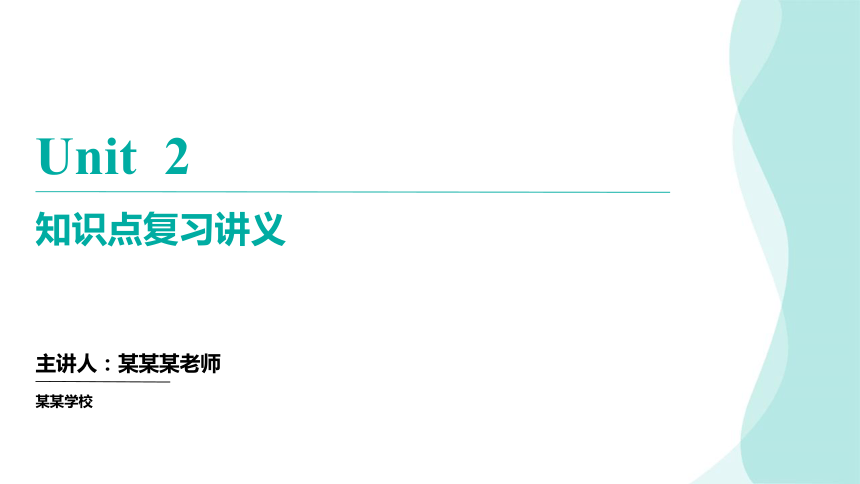 | |
| 格式 | pptx | ||
| 文件大小 | 280.1KB | ||
| 资源类型 | 试卷 | ||
| 版本资源 | 牛津译林版 | ||
| 科目 | 英语 | ||
| 更新时间 | 2024-04-30 23:02:29 | ||
图片预览



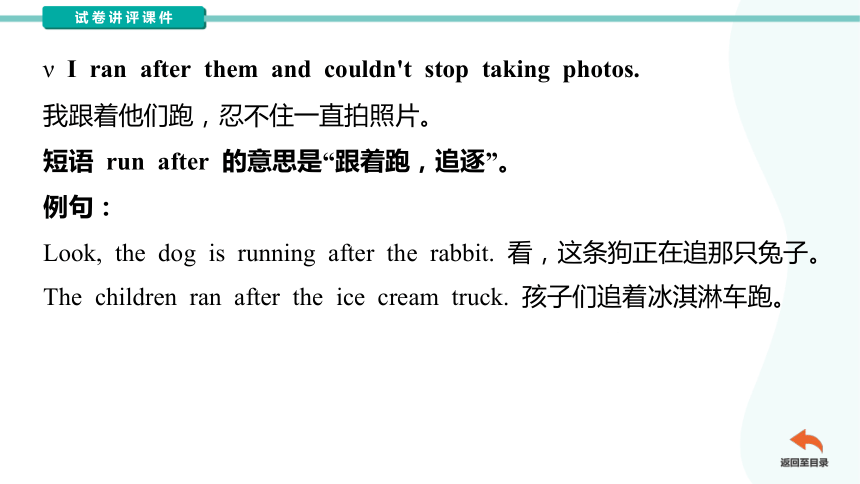
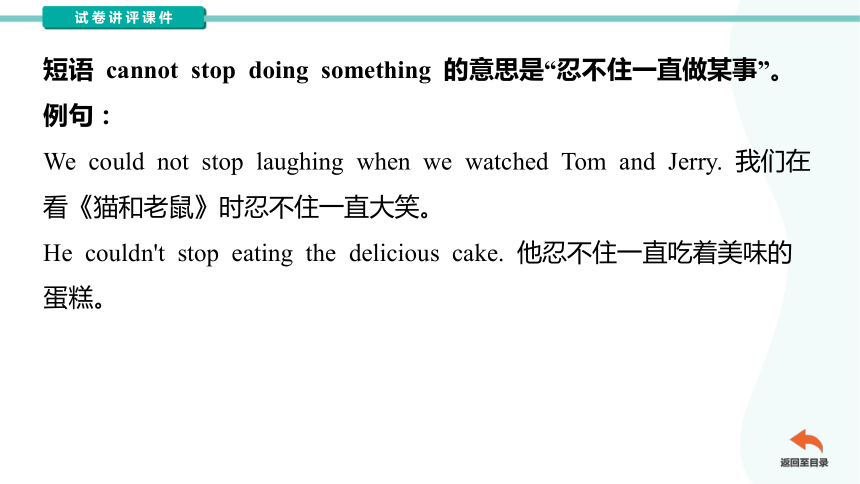
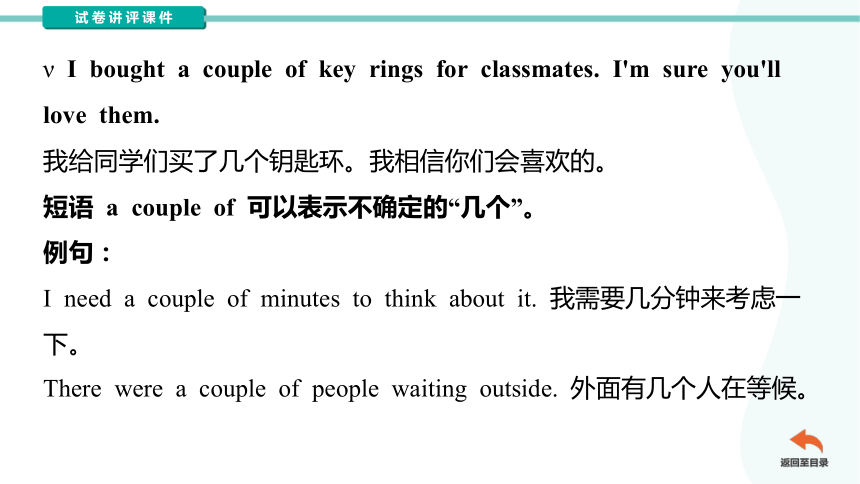
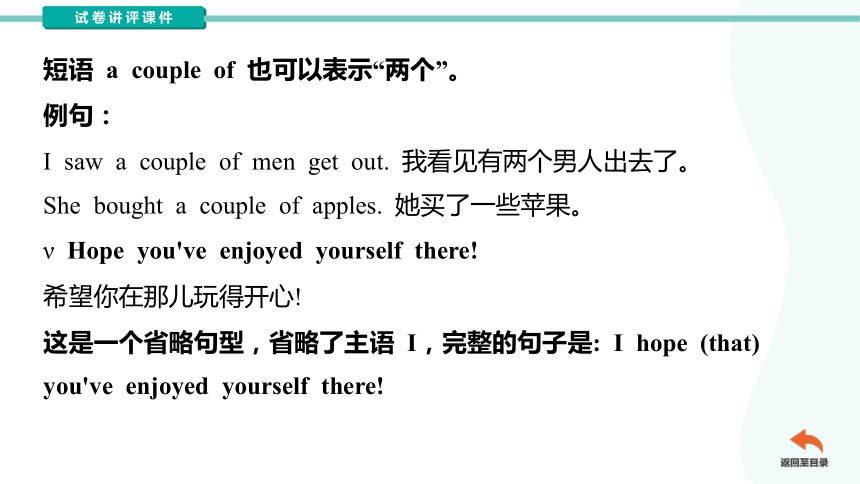
文档简介
(共17张PPT)
Unit 2
知识点复习讲义
主讲人:某某某老师
某某学校
(含答案)
ν I don't think it'll be a holiday for us.
我想对我们而言这不会是什么假期了。
这是一个否定前移的句子,主句中的否定词实际否定的是从句中的内容。
当主句含有 I think, I believe 等词语时,常用否定前移。
这一语言现象说明英美人在表达个人观点时较为含蓄。
例句:
I don't think he will come here today. 我认为他今天不会来这里。
I don't believe she is telling the truth. 我不相信她在说真话。
I didn't think you would be able to make it. 我没想到你能来。
扩展:
否定前移的句式:
主语 + 否定词 + think/believe/expect/suppose/doubt + 从句
ν I ran after them and couldn't stop taking photos.
我跟着他们跑,忍不住一直拍照片。
短语 run after 的意思是“跟着跑,追逐”。
例句:
Look, the dog is running after the rabbit. 看,这条狗正在追那只兔子。
The children ran after the ice cream truck. 孩子们追着冰淇淋车跑。
短语 cannot stop doing something 的意思是“忍不住一直做某事”。
例句:
We could not stop laughing when we watched Tom and Jerry. 我们在
看《猫和老鼠》时忍不住一直大笑。
He couldn't stop eating the delicious cake. 他忍不住一直吃着美味的
蛋糕。
ν I bought a couple of key rings for classmates. I'm sure you'll
love them.
我给同学们买了几个钥匙环。我相信你们会喜欢的。
短语 a couple of 可以表示不确定的“几个”。
例句:
I need a couple of minutes to think about it. 我需要几分钟来考虑一
下。
There were a couple of people waiting outside. 外面有几个人在等候。
短语 a couple of 也可以表示“两个”。
例句:
I saw a couple of men get out. 我看见有两个男人出去了。
She bought a couple of apples. 她买了一些苹果。
ν Hope you've enjoyed yourself there!
希望你在那儿玩得开心!
这是一个省略句型,省略了主语 I,完整的句子是: I hope (that)
you've enjoyed yourself there!
在非正式行文(包括日记、卡片、便条、信件等)中,有时我们会省去主
语,使文字更简洁。
例句:
Hope to hear from you soon. 期待收到你的来信。
See you later! 待会儿见!
Thanks for your help! 谢谢你帮忙!
ν My dad has been to Chengdu on business twice.
我爸爸去成都出差过两次。
句中的 on business 意思为“出差”。
business 的意思是“公事,生意”,该词还有“职责”和“企业”的意思。
例句:
Business is business. 公事公办。
to run a business 经营一家企业
None of your business. 不关你的事。
扩展:
on business 可以与 on vacation 搭配记忆,表示“出差”和“度假”。
ν We're going to take a direct flight to Chengdu.
我们将搭乘直飞航班到成都。
句中的 direct 用作形容词,意思是“直达的”。
例句:
There is a direct high-speed train to Hangzhou. 有一班直达杭州的高
铁。
The direct flight to London takes about 12 hours. 直飞伦敦的航班大
约需要 12 小时。
扩展:
direct 的反义词是 indirect,意思是“间接的”。
ν My parents and I left for the airport in the early morning.
我和父母一大早就前往机场。
句中的 leave for … 意思为“动身去(某处)”。
例句:
The plane leaves for Hong Kong at 10:30. 飞机于 10:30 起飞前往香
港。
We left for the train station early in the morning. 我们一大早就动身
去火车站了。
扩展:
leave for … 的反义词是 arrive at …,意思是“到达(某处)”。
ν It took us about three and a half hours to fly to Hong Kong.
我们花了三个半小时飞到香港。
“三个半小时”还可以表达成 three hours and a half。
“一个半小时”的两种表达方式:
One and a half hours
One hour and a half
扩展:
表示时间时,数字和单位之间通常不加连字符。
【随堂练习】
1. 用否定前移将下列句子改为否定句:
(1) I think he will be successful.
_______________________________
I don't think he will be successful
(2) I believe she is telling the truth.
__________________________________
I don't believe she is telling the truth
(3) I think you would be able to make it.
________________________________________
I didn't think you would be able to make it
2. 将下列句子翻译成英文:
(1) 我们花了两个小时到达机场。
______________________________________
We spent two hours getting to the airport
(2) 我们在飞机上待了三个半小时。
_____________________________________________
We were on the plane for three hours and a half
(3) 外面有几个人在等候。
__________________________________________
There were a couple of people waiting outside
(4) 孩子们追着冰淇淋车跑。
______________________________________
The children ran after the ice cream truck
(5) 我没想到你能来。
________________________________________
I didn't think you would be able to make it
Unit 2
知识点复习讲义
主讲人:某某某老师
某某学校
(含答案)
ν I don't think it'll be a holiday for us.
我想对我们而言这不会是什么假期了。
这是一个否定前移的句子,主句中的否定词实际否定的是从句中的内容。
当主句含有 I think, I believe 等词语时,常用否定前移。
这一语言现象说明英美人在表达个人观点时较为含蓄。
例句:
I don't think he will come here today. 我认为他今天不会来这里。
I don't believe she is telling the truth. 我不相信她在说真话。
I didn't think you would be able to make it. 我没想到你能来。
扩展:
否定前移的句式:
主语 + 否定词 + think/believe/expect/suppose/doubt + 从句
ν I ran after them and couldn't stop taking photos.
我跟着他们跑,忍不住一直拍照片。
短语 run after 的意思是“跟着跑,追逐”。
例句:
Look, the dog is running after the rabbit. 看,这条狗正在追那只兔子。
The children ran after the ice cream truck. 孩子们追着冰淇淋车跑。
短语 cannot stop doing something 的意思是“忍不住一直做某事”。
例句:
We could not stop laughing when we watched Tom and Jerry. 我们在
看《猫和老鼠》时忍不住一直大笑。
He couldn't stop eating the delicious cake. 他忍不住一直吃着美味的
蛋糕。
ν I bought a couple of key rings for classmates. I'm sure you'll
love them.
我给同学们买了几个钥匙环。我相信你们会喜欢的。
短语 a couple of 可以表示不确定的“几个”。
例句:
I need a couple of minutes to think about it. 我需要几分钟来考虑一
下。
There were a couple of people waiting outside. 外面有几个人在等候。
短语 a couple of 也可以表示“两个”。
例句:
I saw a couple of men get out. 我看见有两个男人出去了。
She bought a couple of apples. 她买了一些苹果。
ν Hope you've enjoyed yourself there!
希望你在那儿玩得开心!
这是一个省略句型,省略了主语 I,完整的句子是: I hope (that)
you've enjoyed yourself there!
在非正式行文(包括日记、卡片、便条、信件等)中,有时我们会省去主
语,使文字更简洁。
例句:
Hope to hear from you soon. 期待收到你的来信。
See you later! 待会儿见!
Thanks for your help! 谢谢你帮忙!
ν My dad has been to Chengdu on business twice.
我爸爸去成都出差过两次。
句中的 on business 意思为“出差”。
business 的意思是“公事,生意”,该词还有“职责”和“企业”的意思。
例句:
Business is business. 公事公办。
to run a business 经营一家企业
None of your business. 不关你的事。
扩展:
on business 可以与 on vacation 搭配记忆,表示“出差”和“度假”。
ν We're going to take a direct flight to Chengdu.
我们将搭乘直飞航班到成都。
句中的 direct 用作形容词,意思是“直达的”。
例句:
There is a direct high-speed train to Hangzhou. 有一班直达杭州的高
铁。
The direct flight to London takes about 12 hours. 直飞伦敦的航班大
约需要 12 小时。
扩展:
direct 的反义词是 indirect,意思是“间接的”。
ν My parents and I left for the airport in the early morning.
我和父母一大早就前往机场。
句中的 leave for … 意思为“动身去(某处)”。
例句:
The plane leaves for Hong Kong at 10:30. 飞机于 10:30 起飞前往香
港。
We left for the train station early in the morning. 我们一大早就动身
去火车站了。
扩展:
leave for … 的反义词是 arrive at …,意思是“到达(某处)”。
ν It took us about three and a half hours to fly to Hong Kong.
我们花了三个半小时飞到香港。
“三个半小时”还可以表达成 three hours and a half。
“一个半小时”的两种表达方式:
One and a half hours
One hour and a half
扩展:
表示时间时,数字和单位之间通常不加连字符。
【随堂练习】
1. 用否定前移将下列句子改为否定句:
(1) I think he will be successful.
_______________________________
I don't think he will be successful
(2) I believe she is telling the truth.
__________________________________
I don't believe she is telling the truth
(3) I think you would be able to make it.
________________________________________
I didn't think you would be able to make it
2. 将下列句子翻译成英文:
(1) 我们花了两个小时到达机场。
______________________________________
We spent two hours getting to the airport
(2) 我们在飞机上待了三个半小时。
_____________________________________________
We were on the plane for three hours and a half
(3) 外面有几个人在等候。
__________________________________________
There were a couple of people waiting outside
(4) 孩子们追着冰淇淋车跑。
______________________________________
The children ran after the ice cream truck
(5) 我没想到你能来。
________________________________________
I didn't think you would be able to make it
